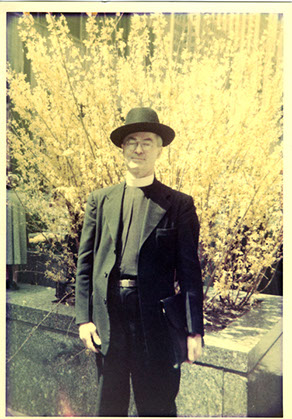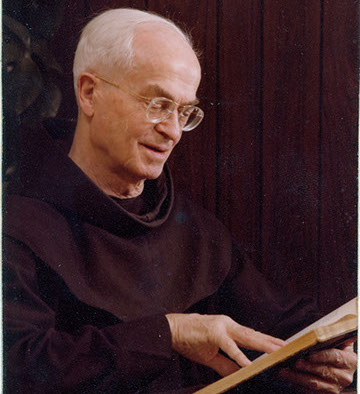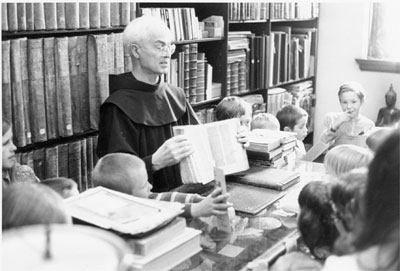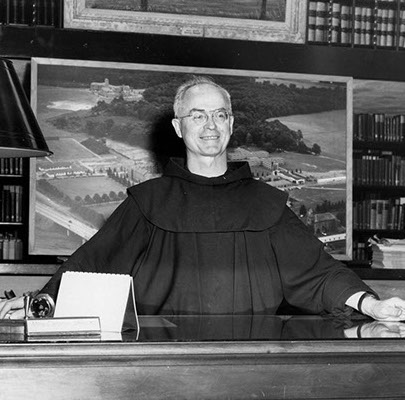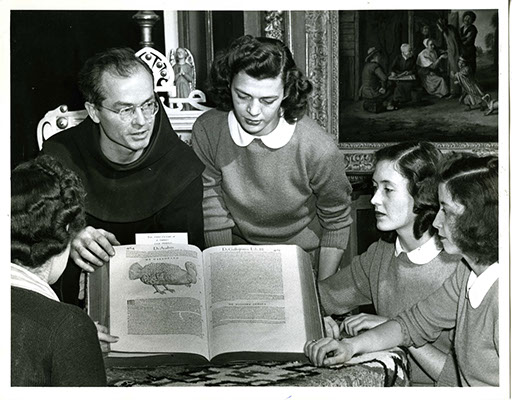Fr. Irenaeus Herscher
Thomas Merton's Important people
Click here for a PDF of this page
(Includes references for further reading)
"Fr. Irenaeus Herscher" in Provincial Annals (Holy Name Province) 32 (1983) p.237-239 (used by permission of the Province):
"A Gentle MAN, a great priest, an exemplary friar. . . ." "Simply being with him produced tonic effects. Nobody ever left him without having profited." "No one was left untouched by his devotion to duty, his fraternity, his minority." Many words of praise and appreciation were spoken and written when the death of Father Irenaeus Herscher became known. He was known by and loved by and respected by a lot of people.
Joseph Herscher was born in Geubwiller, Alsace-Lorraine, France, on March 11, 1902, of Jean Baptiste Herscher and Josephine Hugenclabler. When he was eleven years old, his parents and their six children, five girls and one boy, emigrated to the United States and arrived in Hoboken on the Feast of St. Anthony, June 13, 1913. Educated in Camden schools, Joseph interrupted his studies at Camden High School to work in a New York shipyard. In 1920, he went to New York to see the Provincial about becoming a Franciscan. Thinking at first about becoming a Brother, young Joe took the advice of the Provincial, Father Mathias Faust, and went to the seminary at Callicoon, where he was placed in Second Year. He was received into the Order in Paterson on August 21, 1924, and given the name Irenaeus, a name so befitting such a peaceful person. He made his Simple Profession of Vows on August 24, 1925, and Solemn Profession on August 28, 1928. He was ordained to the Priesthood on June 9, 1931.
In 1932, Irenaeus was sent to St. Stephen's Friary in Croghan to be Assistant Master of Clerics. The following year, he went to Columbia University to study library science. In 1934, after receiving his Master's degree in library science, Irenaeus went to St. Bonaventure College in Allegany to become assistant librarian. When Father Albert O'Brien died in the summer of 1937, Irenaeus became the head librarian, a position he held until 1970, when he retired to become Librarian Emeritus of Friedsam Memorial Library (cf. PROVINCIAL ANNALS, Vol. XXVII [1970, pp. 108-09].
In 1975 he celebrated the Golden Jubilee of his Profession (PROVINCIAL ANNALS, Vol. XXIX, n. 2, p. 169), and in 1980 the Golden Jubilee of his Priesthood.
In the Fall of 1980, Irenaeus had been hospitalized for three months because of a heart condition. On Jan. 26 he went back to the library for a few hours as had been his custom since retirement, with the permission of the doctor. Two days later he woke up at 2 A.M. with another serious cardiac attack, went to the infirmary for help, and died on the way to St. Francis Hospital.
At different times Irenaeus explained the meaning of his religious name: "Irenaeus is derived from the Greek and means 'peaceful.' " Irenaeus exuded peace. A gentle, joyful, loving person, he affected those who met him in a peaceful way. He was a storehouse of knowledge, and he welcomed anyone seeking knowledge. His whole demeanor was so open and friendly that no one ever thought that he was imposing on Irenaeus if he asked him a question. It was as though the questioner ingratiated himself with Irenaeus just by wanting to know something Irenaeus could tell him. For years he was the chronista of St. Bonaventure, and his by-line punctuates issue after issue of the ANNALS. When the ANNALS was revived in 1975 he did the Chronicle section. In the first decade of The Cord's publication, he was a frequent contributor and was then active also with the Franciscan Educational Conference.
And so Irenaeus was "a gentle man." He was also "a great priest." As much as Irenaeus loved his library and loved books, he loved God more. How he enjoyed the privilege of celebrating Mass! How faithful he was to the old people at St. Joseph's Manor, whom he served by celebrating Mass for them daily since the Manor opened. Irenaeus was "an exemplary friar." He loved to pray the Divine Office together with the friars when they gathered in community for prayers. He loved to be with the friars in community for meals and at recreation (9-10 P.M. was his schedule), just to share ideas and stories. He loved being a friar, and the friars loved and respected him.
.
Father Irenaeus was a natural good-will ambassador for St. Bonaventure University and for the Franciscans. Thousands of people who visited and made use of Friedsam Memorial Library at St. Bonaventure (of whose art collection and original manuscripts Irenaeus was so proud [PROVINCIAL ANNALS, Vol. XXI J19781, n. 1, pp. 38-401) took away with them not only what they came to the library to find, but also and especially the memory of a joyful, helpful, holy Franciscan friar (that was Thomas Merton's memory in The Seven Storey Mountain). Holy Name Province and in particular St. Bonaventure University have been blessed by the presence of Father Irenaeus Herscher for many years. May his peaceful soul enjoy everlasting peace.
"Irenaeus Herscher, O.F.M.: An Appreciation" by Thomas T. Spencer in The Cord 33 (1983) p.34-38 (used by permission of The Cord)
WITH THE DEATH OF FATHER IRENAEUS HERSCHER on January 28, 1981, the Franciscan community lost one of its most beloved members. As librarian and archivist at St. Bonaventure University for over forty years, and chaplain of the University's alumni association, Father Irenaeus was a friend to thousands of students, alumni, and visitors who had the good fortune to make his acquaintance. To those who knew him he is best remembered for his cheerful optimism, kindness, humility, dedication to job and vocation, and genuine interest in people. It was these traits that exemplified the Franciscan spirit he so willingly and joyfully conveyed.
To those in the Franciscan and St. Bonaventure communities Father Irenaeus will always be remembered for his happy disposition and his role as custodian of the University's books and rare treasures. But there were other aspects to his life and career that are less well known but equally significant. Especially noteworthy is his long, close friendship with Thomas Merton, that resulted in the formation of the valuable Thomas Merton Collection at St. Bonaventure, and his role as a scholar and historian of Franciscan tradition. His relationship with Merton and his scholarly and popular writings illustrate the Christian spirit for which he is so well remembered, and demonstrate, too, that his contribution to the University and the Franciscans is far more lasting than may be first thought.
Father Irenaeus was born in Haute-Alsace, France, on March 11, 1902. After immigrating to the United States at the age of eleven, he joined the Franciscan Order in 1924. He received his Bachelor of Arts degree from St. Bonaventure in 1929, his M.A. in 1930, and in 1931 he was ordained to the priesthood. After further training in library science at Columbia University, he returned to St. Bonaventure and assumed the job of librarian at Friedsam Memorial Library.1 It was as a young, novice librarian that he first met Thomas Merton.
The friendship between Merton and Father Irenaeus began in the summer of 1939, while Merton was still a student at Columbia University. He was visiting his friend, Bob Lax, whose family lived near St. Bonaventure, and their interest in books led them to the college library where Lax introduced Merton to Father Irenaeus. Their first meeting was somewhat humorous, as Irenaeus repeatedly addressed Merton as Mr. Myrtle. Still, Merton took an immediate liking to the bespectacled Franciscan with whom he would share much in the coming years. Irenaeus allowed the two students to roam freely among the library's stack areas, and Merton was impressed by the happiness and simplicity of the Franciscan spirit that Father Irenaeus seemed to convey.2
The two became even closer during the next two years, when Merton returned to the college to teach English. At this time he was considering seriously entering the Franciscan Order, and through the efforts of Father Thomas Plassmann he was given a job in the English Department. The years teaching English at St. Bonaventure were crucial ones for Merton, as he was struggling to find which avenue his religious vocationshould take. It was in December, 1941, while still teaching at St. Bonaventure, that he made his momentous decision to enter the Trappist Order in Gethsemani, Kentucky.3 Although little noted, the part played by Father Irenaeus in Merton's decision to pursue a religious vocation was substantial. As their friendship grew Merton and Irenaeus had numerous discussions concerning spiritual matters. Merton would frequently return from walks in the nearby woods and ask his librarian friend countless questions about the meaning of life and God's existence. Irenaeus taught Merton to say the Breviary and introduced him to the Shrine of St. Therese on the campus where Merton prayed for his vocation. Therese later became Merton's patron Saint.4
Following Merton's entrance into the Trappist Order the two remained close friends. Irenaeus visited Merton several times during his years at Gethsemani, and they corresponded frequently. Merton requested frequent favors of Irenaeus, stating on one occasion that "I have not forgotten your willingness to go out of your way to help others." Irenaeus assisted Merton with his writing, supplying him with books and copies of manuscripts he deposited at St. Bonaventure, and he even edited some passages, at Merton's request, in what would become The Secular Journal.5 Through their friendship, St. Bonaventure accumulated a sizable collection of Merton materials, including manuscripts of books and articles, as well as correspondence. Today this collection, along with material held at Bellarmine College in Kentucky, is one of two important collections in this country for the study of one of this century's most prolific Catholic writers.
Father Irenaeus's interest in Merton's scholarship stemmed not only from their friendship, but from his own appreciation of scholarship, as witnessed by his historical and scholarly writings, as well as an interest in collecting historical and literary manuscripts and rare treasures, as evidenced by his role as librarian and archivist. Unbeknownst to many, Father Irenaeus wrote many articles and compiled numerous bibliographies on Franciscan history. Of particular note are his early, pioneering articles on the history of St. Bonaventure College and University. These well documented, narrative works stress the positive achievements of the Franciscans in America, and portray the friars not only as missionaries, but as teachers with "a happy faculty of progressing along the broad avenues of experience, yet keeping the memories of the past with all."6
Equally favorable in assessment were his writings about noted Franciscans and individuals who played a vital role not only in the history of St. Bonaventure, but in the Franciscan experience in general. These articles reflect further his spiritual optimism and dedicated interest in the history of the Order. The same could be said, too, for his numerous, less scholarly writings on various phases of the Franciscan educational experience.7
In addition to his own scholarship, Father Irenaeus helped further the research of others through his compilation of bibliographies on Franciscan history and his work as librarian at St. Bonaventure. His numerous published bibliographies provide useful reference tools for scholars of Franciscanism or religious history in general.8 As a librarian and archivist he collected and helped publicize various manuscripts and published materials that today constitute a unique and valuable research collection. He wrote many articles about the University's Friedsam Memorial Library that stressed its unique holdings and sources, and he promoted pioneering techniques that contributed to the research capabilities of the library.9
The friendship with Thomas Merton and the scholarly and professional accomplishments are two small but overlooked achievements in a life and career characterized by Christian commitment and service to others. His life was one marked by dedication to God, and to the Franciscan and University communities he so loved. By his charity and kindness to others, as evidenced by his friendship with Merton, as well as by his scholarship, he exhibited the cheerful and positive sincerity of his Franciscan vocation. Irenaeus Herscher will be missed by many in the St. Bonaventure and Franciscan communities. But his life and career stand as models to be followed by those dedicated to the Christian way of life.
